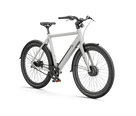The use of Electric Bikes is becoming prevalent in today’s society; a new way to cruise through the streets in style – with minimal effort.
A recent study, taken in June 2019 has found that e-bike riders ended up slightly ahead of cyclists in terms of total weekly exercise.
More than 10,000 European adults were the subject for the study which was recently published in the Transportation Research Interdisciplinary Perspectives journal. The project consisted of determining the amount of time spent engaging in cycling activities per week, and the effort involved.
As it turned out, the average daily distance traveled by e-bike commuters was significantly higher than that traveled by cyclists (8.0 km vs. 5.3 km per person per day). Not only the total daily distance was higher for e-bike riders, but each trip was also longer on average when compared to cyclists (9.4 km vs. 4.8 km). Physical activity, measured by Metabolic Equivalent Task (MET) minutes was also slightly in favour of e-bikers (4463 vs. 4085).

Increase In Exercise
Perhaps a more significant finding within the study was the substantial increase in exercise among those who switched from cars to e-bikes – as opposed to those who transitioned to normal bikes. “Those switching from private motorized vehicles and public transport gained around 550 and 800 MET minutes per week respectively.” Therefore, in terms of boosting regular weekly exercise, the transition from commuting via cars to e-bikes can be far more beneficial than switching from cars to normal bikes.
Authors of the study concluded this finding by stating that the analysis further supports the notion that Governments should accommodate the use of e-bikes by expanding cycling infrastructure; not only for related health benefits but to ease traffic and congestion on our roads. “The health benefits in terms of physical activity of using e-bikes, particularly when replacing car trips, should be factored in when considering subsidizing e-biking.”
Other metrics which were measured in the study were average age and Body Mass Index (BMI) for both e-bike and cyclists. Cyclists were found to have an average BMI of 23.8, while e-bike riders had an average of 24.8 (both in normal range). This may indicate the fact that e-bikes may attract those who are traditionally less physically active commuters who might not have otherwise cycled. The study also found e-bike riders to be a little older too, with the average age of riders being 48.1 years, in comparison to the average cyclist age of 41.4 years.

Our Range
At Lekker, technology meets practicality to bring our customers a comfortable, durable, fast and stylish e-bike range. Our E-Amsterdam is the pinnacle of urban commuting, offering unrestricted and effortless freedom to ride your city, supported by a powerful and reliable machine. The Lekker X is bold, robust and lightweight, a comfortable and practical e-bike which is perfect for your everyday ride. The E-Jordaan is smooth and fast-paced, an e-bike which retains the Dutch style heritage and design whilst being perfectly suited for every terrain.
See our full range of e-bikes here or book a test ride at our Melbourne or Sydney brand stores.





